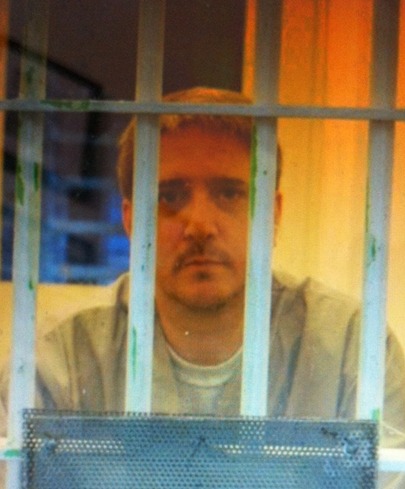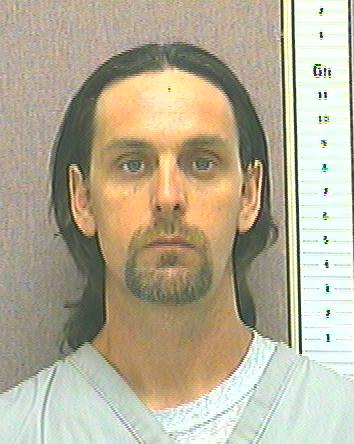aNewDomain –Now that the Oklahoma Court of Criminal Appeals (OCCA) in a 3-2 opinion has denied Richard Glossip’s request for an evidentiary hearing and an emergency stay of execution, there are questions that need answering. These are life and death questions for Glossip, whose execution by lethal injection for the murder of Oklahoma City hotel owner Barry Van Treese now is set for tomorrow, Sept. 30, 2015.
Just hours before he was to be executed earlier this month, Glossip (right) escaped his meeting with the death gurney, receiving a two-week stay so new evidence could be weighed in that case. That new evidence includes statements from Michael Scott, who claims the jailhouse snitch, Justin Sneed, told himhe’d framed Glossip. That’s what Glossip has steadily maintained over the last 18 years. The appellate court has refused the evidentiary hearing request.
 Sneed (pictured below left), who is currently serving a life without parole sentence, admitted in Glossip’s trial that he was the one who actually killed his and Glossip’s boss, Van Treese. He testified that Glossip paid him to do it, which directly led to Glossip’s conviction.
Sneed (pictured below left), who is currently serving a life without parole sentence, admitted in Glossip’s trial that he was the one who actually killed his and Glossip’s boss, Van Treese. He testified that Glossip paid him to do it, which directly led to Glossip’s conviction.
“Glossip was convicted mainly on the testimony of a fellow who actually confessed to killing someone and then concocted a story about Glossip to save his own hide. I’ve seen this same scenario several times. But how trustworthy is that kind of testimony? Now, combine the above with new witnesses … (They may be) shaky, but are they any less trustworthy than the snitch?” commented Jack Gordon, a Tulsa, OK area criminal defense attorney in an interview with aNewDomain this week. Gordon, who is not affiliated with this case, continued:
“Death by lethal injection is permanent and final. The question that should be put to the AG and the governor is: Are you 100 percent sure? The answer cannot be ‘well, two juries said they were.’ I don’t know much about the rest of the evidence other than the money in the decedent’s car that apparently was split or shared with Glossip. But take away the testimony of the snitch entirely. Is there enough evidence to warrant a conviction and then assess a death penalty?”
Gordon, who has defended several capital murder cases, including that of convicted serial killer Gary Alan Walker, said that only through eliminating testimony from Sneed could one really weigh whether justice is being served here.
 “That’s the litmus test,” Gordon added. “I’m not sure anyone has done that. I do not think the execution should go forth.”
“That’s the litmus test,” Gordon added. “I’m not sure anyone has done that. I do not think the execution should go forth.”
There are more reasons to slow down and consider other shaky aspects of Glossip’s conviction, too.
One of them has to do with the long-discredited forensic analyst in his case.
That analyst, Joyce Gilchrist was fired in 2001 after her forensic investigations had been noted as key in the convictions of 10 death row inmates who have since been exonerated. Though she never was charged in connection with her faulty data- Gilchrist passed away in June 2015 — several studies — including this one by Case Western Law School — have noted the role she played in dozens of murder convictions.
When so many death row inmates, who got there based largely on Gilchrist’s testimony, have been shown to be innocent, shouldn’t Glossip’s case be reviewed?
Another starring roll If that’s not reason enough to question, there is also the matter of Oklahoma County death penalty maven, Bob Macy.
In its ruling yesterday, the Oklamoma appellate court declined to address the U.S. Constitution. Instead it elaborated on state statutes that don’t permit the lapse of an 18-year death row inmate or allow additional time for stay of execution to consider the facts of the case or procedural error.
The majority opinion addresses the timing of the execution pursuant to 22 O.S. 2011 Section 1001.1 (E), (F) will take thirty (30) days after the stay is entered. The OCCA states that no witnesses refuted the State’s case.
It states this even though Sneed didn’t testify at the second trial and Gilchrists’ forensic evidence has been questioned and even totally contradicted in several other murder cases.
In the appellate ruling, dissenting opinion refers to the “Forgotten Man” Act — codified at 57 O.S.2013 332.7 — as “set by operation of law” the execution of date. It also, not surprisingly, mentions Gilchrist’s “flawed casework analysis” and “laboratory mismanagement, ”pointing out how her incorrect and falsified evidence has brought 23 accused murders to death row.
Is an innocent man set to die?
Doesn’t it make sense to pause a minute and reconsider the facts leading to Glossip’s conviction, especially considering the corrupt forensic examiner on the case and any motives that the snitch, Sneed, might’ve had before sending Glossip up the river? Shouldn’t Scott be fully heard?
What is the rush here?
For aNewDomain, I’m Jim Kelly.
Order Denying Richard Glossip’s Rescheduling Of Execution Date (Sept. 28, 2015) by Cristian Farias












